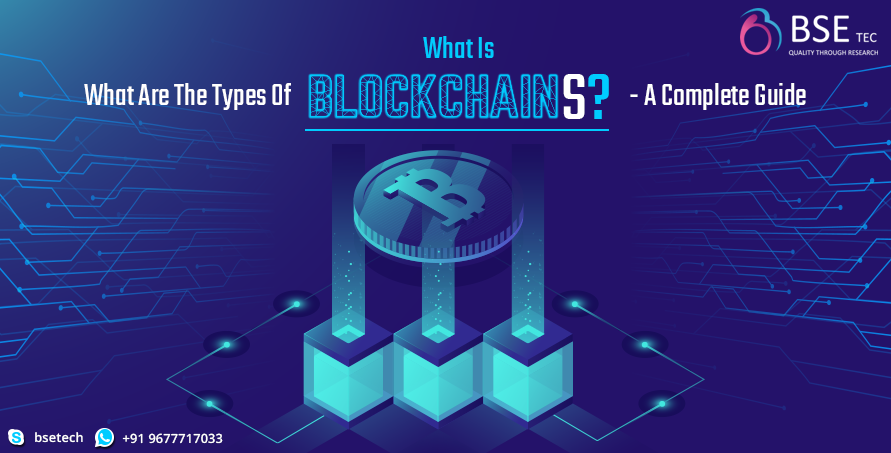What Is Blockchain? What Are The Types Of Blockchains – A Complete Guide.

Blockchain is basically a decentralized database system that does not have any central authority. Blockchain technology is a method of storing data that makes it difficult or impossible to update, hack, or cheat the system.
Understanding Blockchain:
Consider a common ledger notebook in which you, as the company’s owner, record your company’s profits. However, your organization has a black sheep that alters all of the data in the ledger and steals money! You must resolve the problem! So you hired an IT expert to set up a digital ledger on your PC. But the black sheep hacked into the register again and modified the figures! You’re enraged now! You require a full-proof solution for storing your data — a tamperproof, hack-proof method.
Blockchain is the solution!
Blockchain is a new way of record keeping, where all the data are stored in the form of blocks and it is immutable (cannot be altered; it requires a consensus mechanism where the majority of the nodes should agree.)
Advantages of Blockchain:
Blockchain is a new innovative and more secure form of preserving records in which records are
- Secure, since it is distributed (shared among all network members),
- Immutable (cannot be modified),
- Transparent (visible to all network members), and
- Traceability.
Read Five important blockchain benefits!
What is Blockchain? – Definition
A Blockchain, as the name implies, is a chain of blocks. Blockchain is a database containing digital data or information represented as a block in the form of a chain or series, while the chain represents the binding of these blocks using cryptographic methods. This chain of blocks or data is shared in a Distributed network of multiple nodes (computers or servers).
Types of blockchains:
There are 4 significant types of blockchains.
Public Blockchain: A public blockchain is an open network. It is a permissionless distributed ledger technology (DLT) in which anyone can join and involve in core activities and transactions. It is a non-restrictive version of the ledger, with a copy for each peer. This also implies that anyone with an internet connection can connect to the public Blockchain. No changes can be made, it is strictly immutable since it has an open-source code where anyone can check transactions and other records.
Public Blockchain Applications:
- Voting: Governments can conduct elections, where the people can vote via a public blockchain, providing transparency and confidence.
- Fundraising: Companies and projects can use the public Blockchain for fundraising to increase transparency and trust.
Private Blockchain: Private blockchain is not decentralized. It is a distributed ledger technology operating in an enclosed blockchain network that is secured with cryptographic mechanisms. It is a permissioned mechanism where only authorized users or nodes can involve in core activities and other consensus mechanisms. It is also known as permissioned blockchains and business blockchains.
Private Blockchain Applications:
- Supply Chain Management: A private blockchain can be used to manage a company’s supply chain.
- Asset Tracking and Verification: A private blockchain can track and verify assets.
- Internal Voting: With a private blockchain, internal voting is also possible within an organization.
- Hybrid Blockchains: Organizations or enterprises that require the advantages of both public and private blockchains can opt for hybrid blockchains. In a hybrid blockchain, only a certain part of the blockchain is accessible to the public. For example, Transactions and records on a hybrid blockchain are normally not made public, but they can be validated if necessary by allowing access via a smart contract.
Applications of Hybrid Blockchain:
- Real Estate: Real-estate companies can use hybrid networks to run their systems and offer information to the public.
- Retail: The hybrid network can also help retailers streamline their processes.
- Highly Regulated Markets: Hybrid blockchains are also well-suited to highly regulated areas like the banking sector.
Consortium Blockchains: A consortium blockchain refers to a group of private blockchains which are banded together to share information and to improve trust, transparency, accountability, and traceability. It is a permissioned blockchain where only limited nodes can execute a consensus protocol.
Consortium Blockchain Applications:
- Banking and payments: A consortium can be created by a number of banks cooperating. They have authority over which nodes validate transactions.
- Research Labs: To share research data and outputs, a consortium blockchain can be used.
- Food Tracking: It is also useful for tracking food.
Wrapping Up:
Hope you would have understood what is blockchain and its types. Blockchain type varies with every use case and application. If you are an enterprise, you can build your custom blockchain with the help of blockchain developers.
Read Tips For Choosing The Right Blockchain Platform For Your Next Blockchain Development Project
How can we help you?
We are a blockchain development company working on a wide range of blockchain projects. We can create smart contracts and a blockchain network that is secure, transparent, and robust to suit your organization’s needs. Contact BSEtec for more info.




